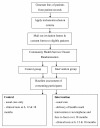The Happy Life Club™ study protocol: a cluster randomised controlled trial of a type 2 diabetes health coach intervention
- PMID: 21303564
- PMCID: PMC3041664
- DOI: 10.1186/1471-2458-11-90
The Happy Life Club™ study protocol: a cluster randomised controlled trial of a type 2 diabetes health coach intervention
Abstract
Background: The Happy Life Club™ is an intervention that utilises health coaches trained in behavioural change and motivational interviewing techniques to assist with the management of type 2 diabetes mellitus (T2DM) in primary care settings in China. Health coaches will support participants to improve modifiable risk factors and adhere to effective self-management treatments associated with T2DM.
Methods/design: A cluster randomised controlled trial involving 22 Community Health Centres (CHCs) in Fengtai District of Beijing, China. CHCs will be randomised into a control or intervention group, facilitating recruitment of at least 1320 individual participants with T2DM into the study. Participants in the intervention group will receive a combination of both telephone and face-to-face health coaching over 18 months, in addition to usual care received by the control group. Health coaching will be performed by CHC doctors and nurses certified in coach-assisted chronic disease management. Outcomes will be assessed at baseline and again at 6, 12 and 18 months by means of a clinical health check and self-administered questionnaire. The primary outcome measure is HbA1c level. Secondary outcomes include metabolic, physiological and psychological variables.
Discussion: This cluster RCT has been developed to suit the Chinese health care system and will contribute to the evidence base for the management of patients with T2DM. With a strong focus on self-management and health coach support, the study has the potential to be adapted to other chronic diseases, as well as other regions of China.
Trial registration: Current Controlled Trials ISRCTN01010526.
Figures
Similar articles
-
Effect of a Health Coach Intervention for the Management of Individuals With Type 2 Diabetes Mellitus in China: A Pragmatic Cluster Randomized Controlled Trial.Front Public Health. 2018 Sep 19;6:252. doi: 10.3389/fpubh.2018.00252. eCollection 2018. Front Public Health. 2018. PMID: 30283767 Free PMC article.
-
Management of type 2 diabetes in China: the Happy Life Club, a pragmatic cluster randomised controlled trial using health coaches.BMJ Open. 2016 Mar 4;6(3):e009319. doi: 10.1136/bmjopen-2015-009319. BMJ Open. 2016. PMID: 26944692 Free PMC article. Clinical Trial.
-
Patient Engagement and Coaching for Health: The PEACH study--a cluster randomised controlled trial using the telephone to coach people with type 2 diabetes to engage with their GPs to improve diabetes care: a study protocol.BMC Fam Pract. 2007 Apr 11;8:20. doi: 10.1186/1471-2296-8-20. BMC Fam Pract. 2007. PMID: 17428318 Free PMC article. Clinical Trial.
-
The effectiveness of peer health coaching in improving glycemic control among low-income patients with diabetes: protocol for a randomized controlled trial.BMC Public Health. 2011 Apr 1;11:208. doi: 10.1186/1471-2458-11-208. BMC Public Health. 2011. PMID: 21457567 Free PMC article. Clinical Trial.
-
Psychological interventions to improve self-management of type 1 and type 2 diabetes: a systematic review.Health Technol Assess. 2020 Jun;24(28):1-232. doi: 10.3310/hta24280. Health Technol Assess. 2020. PMID: 32568666 Free PMC article.
Cited by
-
Transforming global approaches to chronic disease prevention and management across the lifespan: integrating genomics, behavior change, and digital health solutions.Front Public Health. 2023 Oct 13;11:1248254. doi: 10.3389/fpubh.2023.1248254. eCollection 2023. Front Public Health. 2023. PMID: 37905238 Free PMC article. Review.
-
Integrative Health Coaching and Motivational interviewing: Synergistic Approaches to Behavior Change in Healthcare.Glob Adv Health Med. 2013 Jul;2(4):28-35. doi: 10.7453/gahmj.2013.037. Glob Adv Health Med. 2013. PMID: 24416683 Free PMC article.
-
Effect of a Health Coach Intervention for the Management of Individuals With Type 2 Diabetes Mellitus in China: A Pragmatic Cluster Randomized Controlled Trial.Front Public Health. 2018 Sep 19;6:252. doi: 10.3389/fpubh.2018.00252. eCollection 2018. Front Public Health. 2018. PMID: 30283767 Free PMC article.
-
Assessment of type 2 diabetes mellitus patients' behavioral characteristics associated with integrated treatment and prevention services in community health centers in China.Front Public Health. 2023 Jan 25;10:1084946. doi: 10.3389/fpubh.2022.1084946. eCollection 2022. Front Public Health. 2023. PMID: 36761334 Free PMC article.
-
Management of type 2 diabetes in China: the Happy Life Club, a pragmatic cluster randomised controlled trial using health coaches.BMJ Open. 2016 Mar 4;6(3):e009319. doi: 10.1136/bmjopen-2015-009319. BMJ Open. 2016. PMID: 26944692 Free PMC article. Clinical Trial.
References
-
- World Health Organization. 2008-2013 Action Plan of the Global Strategy for the Prevention and Control of Noncommunicable Diseases. Geneva: World Health Organization; 2008.
-
- National Preventative Health Taskforce. Australia: the healthiest country by 2020. Discussion paper. Canberra: Commonwealth of Australia; 2008.
Publication types
MeSH terms
Associated data
LinkOut - more resources
Full Text Sources
Medical



